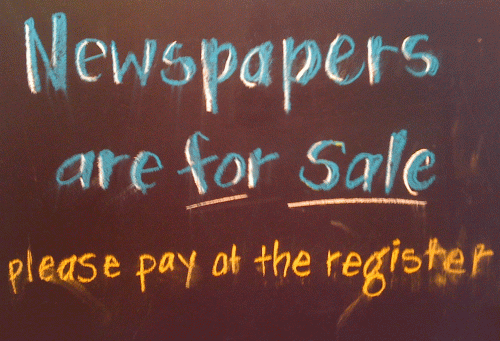
The health of traditional media simmered under the surface at SoFresh, a new social-media marketing conference in Charlotte on Monday, as businesses studied strategies to spread their messages directly.
Interest in the business of journalism and news organizations goes far beyond news industry circles. Discussions have spilled into civic and business meetings as people try to figure out a new ecosystem for delivering messages.
In particular, the question of whether and how people should pay for online news has become quite heated. But if you only listen on Twitter to @jayrosen_nyu with more than 25,000 followers, and @jeffjarvis with just more than 24,000, your picture of the thinking in the industry will become skewed.
Using the same disrupting tools of the new ecosystem, anyone with time can go back to school to study the field from a broad range of voices. Twitter discussions about journalism break out at all hours. Some carry the humor and conflict of skits from “Saturday Night Live.”
Remember the phrase, “Jane, you ignorant slut?”
Others conjure up visions for me of thoughtful editors sipping coffee, reading their morning “papers” and discussing news and theory respectfully. Some are scattered in unlikely places, like Iowa, Upstate South Carolina and North Dakota.
Be careful as you read. Lots of emotions swirl because people’s livelihoods and reputations are on the line. Plus storytellers know that conflict sells. But emotions are contagious, and the questions about news and journalism should not be a battle of us against them.
The discussions often happen virtually on Twitter, and you can listen. Keep in mind, though, that many of the true innovators are out doing, and walking the walk. Judge them by what they make.
Others are teaching, and sharing online in various ways, for free. Find them by looking at sites associated with journalism foundations or colleges.
So now on to practical matters about how you can further the conversation:
- Find voices on Twitter. Poke around in list of people that @underoak follows on Twitter. That’s my personal account, and it’s heavily skewed toward journalism. I tried making a list, but it’s too long and I’m afraid I’ll leave someone out and hurt feelings. Be mindful of the diversity of the voices you choose to follow. It will broaden your thinking.
- Use hash tags when you share links or your own thoughts. Brandon Uttley of Charlotte reminded me at the @sofresh conference that he briefly used the tag #localpaper, and discussions gained traction for a while. Perhaps it’s time to renew the tag. Many in Charlotte and elsewhere have also used the tag #FoJ, for future of journalism. The tag has stuck, though the future indeed is already here.
- Do the reading. Many of the current debates are reflections of discussions that have been going on for years. Start with Phil Meyer’s “The Vanishing Newspaper.” And a self-serving note: My research project for a UNC class in the fall of 2007 was focused on how society should pay for news. There’s a PDF (free!) available from this post. It’s enlightening to go back in time and see which experiments have lasted. Davidsonnews.net is one inspiring local example.
- Create and attend some real-life meetups to barter skills and ideas with others. Social Media Charlotte has a Bloggers and Journos group. Rhi Bowman and I plan to talk about the freelance life on Sept. 14. Dave Cohn of Spot.Us dialed in via Skype for one meeting. If you’re local, come on by. It’s free. If you’re not local, use your own existing groups or start new ones if none exist.
The industry is changing quickly, and those changes affect many other institutions and businesses. It’s refreshing to see a broad community focus on how information can and should be shared sustainably. Eventually, we’ll find the answers.


